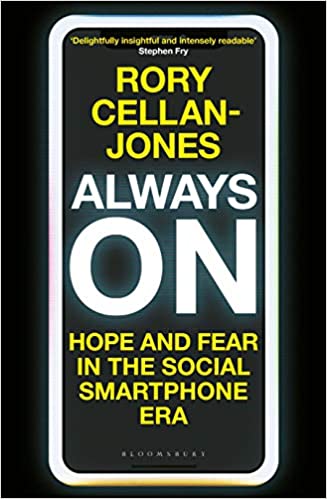You have /5 articles left.
Sign up for a free account or log in.
 Always On: Hope and Fear in the Social Smartphone Era by Rory Cellan-Jones
Always On: Hope and Fear in the Social Smartphone Era by Rory Cellan-Jones
Published in July 2021
What technology has been irreplaceable in allowing you to navigate COVID?
If the pandemic had struck in 2000 and not 2020, what would be that not-yet-invented (or matured) technology whose absence would make remote work and social distancing impossible to navigate?
Of course, we are going to think about these questions from the perspective of academia. Zoom allowed us to teach and meet synchronously. Slack supports unstructured conversations and information sharing. Google Docs enables collaborative writing.
How might a journalist answer these questions?
Rory Cellan-Jones has been a BBC tech and financial reporter for 40 years. (He recently announced that he will be retiring from the BBC.)
His new book, Always On, is one of the first books of many that I expect to be written about the impact of the pandemic on technology and society.
Always On is not so much about how COVID will change technology but how the pandemic might change how we think about the technologies we use.
Before reading Always On, I had not heard of the book's author. I imagine that Cellan-Jones is somewhat of a household name in Great Britain. (He has more than 188,000 Twitter followers -- if that means anything.)
Part of the story that Cellan-Jones tells in Always On is how his thinking about technology has evolved since the pandemic began. And part of the book is about the author's diagnosis of early-stage Parkinson's disease. This diagnosis does not appear to have slowed down his journalistic productivity during the COVID lockdown.
One of the themes of Always On is a recognition of just how beneficial and essential a range of technologies has been during the pandemic.
Prior to the spread of COVID, there was a general tech backlash brewing. Books such as The Four: The Hidden DNA of Amazon, Apple, Facebook, and Google (Galloway 2017); Chaos Monkeys: Obscene Fortune and Random Failure in Silicon Valley (Martinez 2016); Move Fast and Break Things: How Facebook, Google, and Amazon Cornered Culture and Undermined Democracy (Taplin 2017); Irresistible: The Rise of Addictive Technology and the Business of Keeping Us Hooked (Alter 2017); and Uncanny Valley (Wiener 2020) all painted dramatically unfavorable portraits of big tech companies and the products and services that they have created. (Links go to my reviews of these books.)
In 2017, Jean M. Twenge, a professor of psychology at San Diego State University, published an article in The Atlantic asking, “Have Smartphones Destroyed a Generation?”
(I took on Twenge's arguments in this space.)
Cellan-Jones spends considerable time exploring Twenge's arguments in Always On, and he too finds them wanting. Smartphones were a lifeline to both teens and everyone else during the pandemic.
Always On entertainingly describes Cellan-Jones's reporting of the iPhone launch of 2007. When the iPhone was launched, few journalists or technology thinkers (or academics) fully understood the game-changing nature of the technology.
A March 2021 article in The Independent listed the iPhone as the most important new technology of the 21st century, beating out other competitors such as social media, 5G, VR/AR, electric cars and cryptocurrency.
On cryptocurrency, Cellan-Jones is highly dubious. Parts of Always On describe the author's reporting on the crypto business and the host of shady characters that digital currencies seem to attract. I share a similar skepticism toward Bitcoin and other cryptocurrencies, so I was receptive to the arguments in Always On. Your perspective may differ.
All in all, I found the very British orientation of Always On to be a refreshing take on the usual American-centric tech books that I tend to read. (And I learned that Raspberry Pi is a U.K. invention.)
It is good to have journalists writing about technology and society during COVID. It would be even better when academics start to write those books.
What are you reading?




